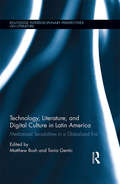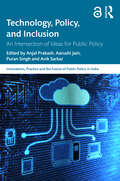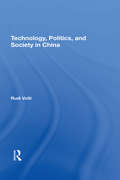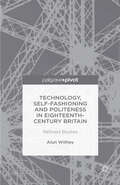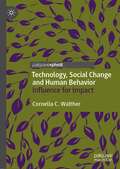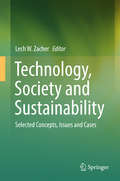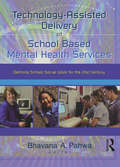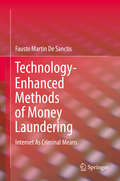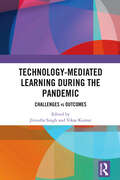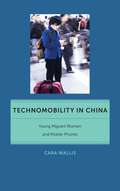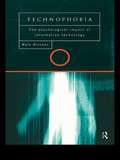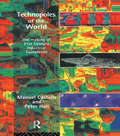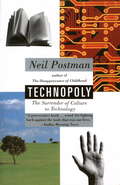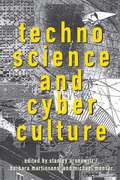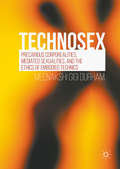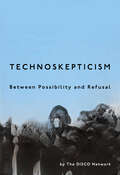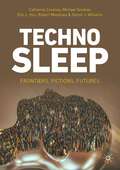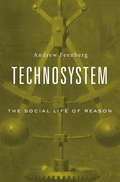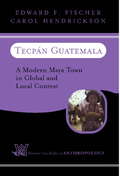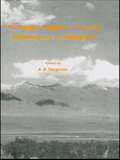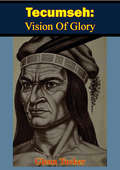- Table View
- List View
Technology, Literature, and Digital Culture in Latin America: Mediatized Sensibilities in a Globalized Era (Routledge Interdisciplinary Perspectives on Literature)
by Tania Gentic Matthew BushGrappling with the contemporary Latin American literary climate and its relationship to the pervasive technologies that shape global society, this book visits Latin American literature, technology, and digital culture from the post-boom era to the present day. The volume examines literature in dialogue with the newest media, including videogames, blogs, electronic literature, and social networking sites, as well as older forms of technology, such as film, photography, television, and music. Together, the essays interrogate how the global networked subject has affected local political and cultural concerns in Latin America. They show that this subject reflects an affective mode of knowledge that can transform the way scholars understand the effects of reading and spectatorship on the production of political communities. The collection thus addresses a series of issues crucial to current and future discussions of literature and culture in Latin America: how literary, visual, and digital artists make technology a formal element of their work; how technology, from photographs to blogs, is represented in text, and the ramifications of that presence; how new media alters the material circulation of culture in Latin America; how readership changes in a globalized electronic landscape; and how critical approaches to the convergences, boundaries, and protocols of new media might transform our understanding of the literature and culture produced or received in Latin America today and in the future.
Technology, Policy, and Inclusion: An Intersection of Ideas for Public Policy (Innovations, Practice and the Future of Public Policy in India)
by Anjal Prakash, Aarushi Jain, Puran Singh, and Avik SarkarTechnology, Policy, and Inclusion looks at the intersections between public policy and technology in India. It explores the barriers in instituting effective governance and development and examines how these can be mitigated through technological interventions in developing countries. Increased digitisation of the economy has added to the development challenges in India and issues such as exclusion and social inequality. This volume stresses the need for governments to leverage technology to bring more vulnerable and marginalised groups into the fold of financial and social inclusion. It also focuses on the importance of regulation for a responsible integration of technologies and minimising risks. The book includes examples and case studies from different areas including management of the COVID-19 pandemic through digital means, real estate digital infrastructure, digital census, e-markets for farmers, and government interventions that use technology to deliver financial services in remote areas of the country. It also outlines various solutions for fostering equity and socio-economic development. Part of the Innovations, Practice and the Future of Public Policy in India series, this volume will be of interest to students and researchers of public policy, political science, development studies, and sociology as well as policy professionals and technocrats. This book is freely available as a downloadable Open Access PDF at http://www.taylorfrancis.com under a Creative Commons (CC-BY-NC-ND) 4.0 license.
Technology, Politics, And Society In China
by Rudi VoltiThis study is the first to summarize the major technological policies implemented in China since 1949 and to place them in their social and historical context. Dr. Volti looks at technological change in China as part of a broader process of economic, political, cultural, and organizational change, focusing primarily on four key areas—agriculture, energy, ground transportation, and medicine and public health. He emphasizes how technological change has been shaped by political and ideological structures, notes how China’s unique cultural heritage has affected adoption of technologies developed outside China, and assesses China’s success in developing technologies appropriate to its specific needs as an economically and politically developing nation. He draws on interviews with technicians engaged in the transfer of technology to China as well as extensive primary source materials.
Technology, Self-Fashioning and Politeness in Eighteenth-Century Britain: Refined Bodies
by A. WitheyThe second half of the eighteenth century brought important changes in attitudes towards shaping the body. New expectations of polite conduct, deportment and demeanour were projected onto the body, with emphasis laid upon neatness, elegance and a 'natural' body shape. Deformities were to be concealed, whilst bodily surfaces were managed to convey a harmonious whole. A large number of 'technologies of the body' were involved in this process, including wooden legs, elastic trusses, and even wigs. But the introduction of a new type of steel - cast steel - around 1750, offered new material possibilities for shaping the body. The physical properties of steel transformed the design and function of many instruments, from postural devices to spectacles, and even the smallest daily items of toilette. By no means was steel the only material involved in transforming the body. Neither did it simply sweep away all that had gone before. But, as an 'enlightened metal', cast steel was a key material in the refinement of the body.
Technology, Social Change and Human Behavior: Influence for Impact
by Cornelia C. WaltherThis book looks at the changing continuum that links individuals, communities and society. An outline of Aspirational Algorithms (AA) and Valuable Wearables is presented as tools to shift from an AI culture to the cultivation of Augmented Humanity (AH). The human mindset that is behind the design and use of technology determines the outcomes of technology. If the intended outcome is the common good, then the preceding human aspiration must be geared toward that goal. Only technology that is conceived with the aspiration of a society that lifts individuals to fulfill their potential can be a game-changer for good. Seeing the constant interplay between the four levels of human existence – soul, heart, mind, body, expressed as aspirations, emotions, thoughts and sensations, how technology may serve to systematically sway individuals from inspiration to desire, from informing to the ignition of tangible transformation. This transition is explained in the book along the scale of influence. Two convergent and mutually influencing dynamics are analyzed: first, the influence of values and aspirations on the impact of technology, and second, the influence of technology on the attitude and action of users. Both assess how hardware and software can serve a maximum of people to live a meaningful happy life.
Technology, Society and Sustainability
by Lech W. ZacherThis collection is a multidisciplinary and multicultural contribution to the current sustainability discourse. It is focused on two main dimensions of our world: complexity and diversity. Desirable and urgent transition of socio-technological systems toward a sustainability trajectory of development requires a better understanding of technological trends and social transformations. General advancement of technology does not produce identical changes in various societies, differentiated economically and culturally. Moreover, the abilities to approach sustainable development change over time and space. As a result there is a constant need for continuing research, analyses, and discussions concerning changing contexts and adequacy of strategies and policies. Authors from twelve countries and of different academic and cultural settings present their insights, analyses and recommendations. The collection is focused both on contexts and on activities leading to sustainable trajectories in various domains of economy and social life. Continuing research and discussion is needed to better understand these challenges and to prepare the appropriate strategies and solutions. Development of socio-technological systems is nowadays very complex; moreover, the world we live in is extremely diverse. Therefore, sustainability discourse must be ongoing, introducing new ideas, concepts, theories, evidence and experience by various parties--academics, professionals, and practitioners.
Technology, Tradition and the State in Africa
by Jack GoodyOriginally published in 1971 this book argues that certain aspects of traditional African social systems have been misunderstood because of a failure to appreciate what is implied by important differences between the technologies of the major traditional African states and those of Europe and Asia. Differences in the modes of agricultural production were connected with differences in other aspects of the social system such as the relations between subjects and chiefs. This means that comparisons with the feudal systems of Western Europe or the monarchies of Asiatic states have definite limitations. Differences in technology not only affected not only the means of production but also of destruction. The importance of differential access to the means of domination is stressed as a critical factor in African political systems. This is an aspect which has been obscured in many studies that have relied largely on material gathered after the establishment of colonial rule.
Technology-Assisted Delivery of School Based Mental Health Services: Defining School Social Work for the 21st Century
by Bhavna PahwaLearn how computer technology is helping school social workers collect information and synthesize it into meaningful data! Technology-Assisted Delivery of School Based Mental Health Services: Defining School Social Work for the 21st Century explores the many technological advances in school social work practices. This book also illustrates the ways technology is being used to manage and evaluate services provided by school social workers. This vital book contains: ways to use new technology to prevent and treat mental health issues in children through safe and effective learning experiences information on how biofeedback can be used to empower children to become more aware of their physical and emotional reactions to environmental stimuli an annotated bibliography of Internet sites covering topics and issues frequently encountered by social workers examinations of exciting software applications, including BARN, From Mad to Worse, Conflict Management, and Smart Team methods of online data collection for use in school social work practices and more!
Technology-Enhanced Methods of Money Laundering: Internet As Criminal Means
by Fausto Martin De SanctisThis book identifies and examines the novel ways in which money is laundered internationally through illegal activities on the internet, focusing on sales, payments, social media, online gaming, and tax misapplication. Technology-enhanced methods that enable money laundering are now a significant portion of malicious cyber activities and deterring its commission is a high order priority. Although powered by modern tools, investigators, prosecutors, judges and regulatory agencies in most countries are not equipped to accurately detect, investigate and prosecute this type of criminal activity. It makes a case for broader institutional and regulatory improvement, formulating a basis for detecting evolving money laundering schemes with multiple focuses on sales, payments, social media, online gaming, and tax misapplication. Revealing the newest techniques used by criminals, currently neglected by law enforcement in most countries, and discusses the best approaches to combat these crimes, this book will be useful as a guide for law enforcement, prosecutors, judges, and others involved in efforts to curb online crimes.
Technology-mediated Learning During the Pandemic: Challenges vs Outcomes
by Vikas Kumar Jitendra SinghThis volume discusses the emergence of information and communication technology (ICT)-based teaching and learning during the Covid-19 pandemic as a potential alternative to traditional classroom-based learning. It presents a collection of theories, practices, and case studies from across the globe and covers different aspects of education from a multidisciplinary perspective.While focusing on the various opportunities that surfaced while carrying out innovative experiments in the online learning space, the book discusses pedagogical challenges and the need for a shift in teaching pedagogy towards online learning. It outlines the existing learning theories, reasons behind their failure, and new theories that emerged to fill the need for new methods for delivery of content and pedagogy. The book discusses the issues faced by stakeholders, including institute administrators, students, and teachers to prepare for this new method of teaching and learning. It highlights the role of virtual laboratories in supplementing the needs of students in the remote learning environment. The book also discusses the role and impact of social media as a powerful tool of learning and educational communication.This book will be of interest to teachers, students, and researchers of education, higher education, digital education, information technology, educational psychology, and media studies. It will also be useful for courses on e-learning, educationalists, policymakers, educational institutions, online education centres, and practitioners working in the related areas.
Technomobility in China: Young Migrant Women and Mobile Phones (Critical Cultural Communication #11)
by Cara WallisWinner of the 2014 Bonnie Ritter Book AwardWinner of the 2013 James W. Carey Media Research AwardAs unprecedented waves of young, rural women journey to cities in China, not only to work, but also to “see the world” and gain some autonomy, they regularly face significant institutional obstacles as well as deep-seated anti-rural prejudices. Based on immersive fieldwork, Cara Wallis provides an intimate portrait of the social, cultural, and economic implications of mobile communication for a group of young women engaged in unskilled service work in Beijing, where they live and work for indefinite periods of time.While simultaneously situating her work within the fields of feminist studies, technology studies, and communication theory, Wallis explores the way in which the cell phone has been integrated into the transforming social structures and practices of contemporary China, and the ways in which mobile technology enables rural young women—a population that has been traditionally marginalized and deemed as “backward” and “other”—to participate in and create culture, allowing them to perform a modern, rural-urban identity. In this theoretically rich and empirically grounded analysis, Wallis provides original insight into the co-construction of technology and subjectivity as well as the multiple forces that shape contemporary China.
Technophobia: The Psychological Impact of Information Technology
by Mark J. BrosnanTechnology is taking over all aspects of life. Yet studies have shown that up to one half the population is 'technophobic'. This means having negative opinions or being anxious about information technology like personal computers. This book examines the origins of technophobia - what it is, who has it and what causes it.The impact of gender is examined and the social and cognitive psychological factors underlying technophobia are reviewed and combined into an overall psychological model. Techniques for reducing technophobia are discussed, and the effect of technophobia on everyone from school children to teenagers is analysed. Technophobia will be useful both for academic study of the area, and for those devising IT policy in schools, business and government.
Technopoles of the World: The Making of 21st Century Industrial Complexes
by Manuel CastellsTechnopoles - planned centres for the promotion for high- technology industry - have become a key feature of national economic development worldwide. Created out of a technological revolution, the formation of the global economy and the emergence of a new form of economic production and management, they constitute the mines and foundries of the information age, redefining the conditions and processes of local and regional development. This book is the first systematic survey of technopoles in all manifestations: science parks, science cities, national technopoles and technobelt programmes. Detailed case studies, ranging from the Silicon Valley to Siberia and from the M4 Corridor to Taiwan, relate how global technopoles have developed, what each is striving to achieve and how well it is succeeding. Technopoles of the World distills the lessons learnt from the successes and failures, embracing a host of disparate concepts and a few myths, and offering guidelines for national, regional and local planners and developers worldwide.
Technopoly: The Surrender of Culture to Technology
by Neil PostmanIn this witty, often terrifying work of cultural criticism, the author of Amusing Ourselves to Death chronicles our transformation into a Technopoly: a society that no longer merely uses technology as a support system but instead is shaped by it--with radical consequences for the meanings of politics, art, education, intelligence, and truth.From the Trade Paperback edition.
Technoprecarious
by Precarity LabAn analysis that traces the role of digital technology in multiplying precarity.Technoprecarious advances a new analytic for tracing how precarity unfolds across disparate geographical sites and cultural practices in the digital age. Digital technologies--whether apps like Uber built on flexible labor or platforms like Airbnb that shift accountability to users--have assisted in consolidating the wealth and influence of a small number of players. These platforms have also furthered increasingly insecure conditions of work and life for racial, ethnic, and sexual minorities, women, indigenous people, migrants, and peoples in the global south. At the same time, precarity has become increasingly generalized, expanding to include even the creative class and digital producers themselves.
Technoscience and Cyberculture: A Cultural Study
by Stanley Rronowitz, Barbara Martinsons, and Michael Menser with Jennifer RichTechnoculture is culture--such is the proposition posited in Technoscience and Cyberculture, arguing that technology's permeation of the cultural landscape has so irrevocably reconstituted this terrain that technology emerges as the dominant discourse in politics, medicine and everyday life. The problems addressed in Technoscience and Cyberculture concern the ways in which technology and science relate to one another and organize, orient and effect the landscape and inhabitants of contemporary culture.
Technosex
by Meenakshi Gigi DurhamIn this book, Meenakshi Gigi Durham outlines and advances a progressive feminist framework for digital ethics in the technosexual landscape,exploring the complex and evolving interrelationships between sex and tech. Today we live in a "sexscape," a globalized assemblage of media, transnational capital, sexual practices, and identities. Sexuality suffuses the contemporary media-saturated environment; we engage with sex via cellphone apps and airport TVs, billboards and Jumbotron screens. Our techniques of sexual representation and body transformation -- from sexting to plastic surgeries -- occur in relation to our deep and complex engagements with mediated images of desire. These technosexual interactions hold the promise of sexual liberation and boldly imaginative pleasures. But in the machinic suturing of technologies with bodies, the politics of race, class, gender, and nation continue to matter. Paying acute attention to media's relationship to the politics of location, social hierarchies, and regulatory schemas, the author mounts a lucid and passionate argument for an ethics of technosex invested in the analysis of power.
Technoskepticism: Between Possibility and Refusal (Sensing Media: Aesthetics, Philosophy, and Cultures of Media)
by DISCO NetworkFrom Munchausen by Tiktok to wellness apps to online communities to AI, the DISCO Network explores the possibilities that technoskepticism can create. This is a book about possibility and refusal in relation to new technologies. Though refusal is an especially powerful mode—particularly for those who have historically not been given the option to say no—people of color and disabled people have long navigated the space between saying yes and saying no to the newest technologies. Technoskepticism relates some of these stories to reveal the possibilities skepticism can create. The case for technoskepticism unfolds across three sections: the first focused on disability, the creative use of wellness apps, and the desire for diagnosis; the second on digital nostalgia and home for Black and Asian users who produced communities online before home pages gave way to profiles; and the third focused on the violence inherent in A.I.-generated Black bodies and the possibilities for Black style in the age of A.I. Acknowledging how the urge to refuse new technologies emerges from specific racialized histories, the authors also emphasize how care can look like an exuberant embrace of the new.
Technosleep: Frontiers, Fictions, Futures
by Simon J. Williams Robert Meadows Michael Greaney Eric L. Hsu Catherine CoveneyThis book draws on a variety of substantive examples from science, technology, medicine, literature, and popular culture to highlight how a new technoscientifically mediated and modified phase and form of technosleep is now in the making – in the global north at least; and to discuss the consequences for our relationships to sleep, the values we accord sleep and the very nature and normativities of sleep itself.The authors discuss how technosleep, at its simplest denotes the ‘coming together’ or ‘entanglements’ of sleep and technology and sensitizes us to various shifts in sleep–technology relations through culture, time and place. In doing so, it pays close attention to the salience and significance of these trends and transformations to date in everyday/night life, their implications for sleep inequalities and the related issues of sleep and social justice they suggest.
Technosystem: The Social Life of Reason
by Andrew FeenbergWe live in a world of technical systems designed in accordance with technical disciplines and operated by technically trained personnel—a unique social organization that largely determines our way of life. Andrew Feenberg’s theory of social rationality represents both the threats of technocratic modernity and the potential for democratic change.
Tecpan Guatemala
by Edward F Fischer Carol HendricksonIn this ethnographic study of the indigenous Tecpaneco people of the Guatemalan highlands, Fischer (anthropology, Vanderbilt U. ) and Hendrickson (anthropology, Marlboro College) describe traditional and changing Mayan life as it responds to the modern world. The book includes b&w photos; illustrations; boxed information on archeological, linguistic, and other aspects of Mayan culture; and a glossary. Annotation c. Book News, Inc. , Portland, OR (booknews. com)
Tecpan Guatemala
by Edward F Fischer Carol HendricksonThis case study of a highland Guatemala town examines what it means to be Maya in a rapidly changing and globalized world. In providing an historical synopsis of the Kaqchikel Maya from pre-Columbian and Colonial times to the present day, this volume focuses on the dynamics of clutural boundaries in light of the use of the Kaqchikel language versus Spanish, the growing role of Protestantism and the revitalization of Maya religion versus Catholicism, and the effects of violent civil war on social networks. It examines the role of weaving and export agriculture in linking Tecpanecos to larger economic and political orbits and for defining local, regional, and national identities. As a result, this accessibly written book demonstrates that even seemingly traditional Maya cultural forms are actively constructed in the context of intense global connections.
Tecpan Guatemala
by Edward F Fischer Carol HendricksonThis case study of a highland Guatemala town examines what it means to be Maya in a rapidly changing and globalized world. In providing an historical synopsis of the Kaqchikel Maya from pre-Columbian and Colonial times to the present day, this volume focuses on the dynamics of clutural boundaries in light of the use of the Kaqchikel language versus Spanish, the growing role of Protestantism and the revitalization of Maya religion versus Catholicism, and the effects of violent civil war on social networks. It examines the role of weaving and export agriculture in linking Tecpanecos to larger economic and political orbits and for defining local, regional, and national identities. As a result, this accessibly written book demonstrates that even seemingly traditional Maya cultural forms are actively constructed in the context of intense global connections.
Tectonics, Magmatism and Metallogeny of Mongolia
by A. B. DergunovThis volume provides the first systematic description of the most important geological structures of Mongolia and discusses the main features of these structures and their interactions. The main characteristics of magmatism are described for each stage of tectonic development and the evolution of magmatism is considered with reference to lithosphere development. Mongolia is a key region of the world and this volume provides a primary source of reference for postgraduates and researchers.
Tecumseh: Vision Of Glory
by Glenn TuckerIn the years just preceding the War of 1812 one man, an Indian, dominated the American frontier--Tecumseh. He emerges here as a vivid, splendid character, a man of unusual talents and noble aims, whereas in much previous history and biography he has been depicted as a baffling, sinister, often bloody figure--a man of inscrutable motives whose scheming for a time actually threatened to delay the settlement of the Northwest.Tecumseh's great oratorical powers, his statesmanship, his military acumen, his personal magnetism won him the passionate loyalty of his Indians and the admiration of even his white enemies. In nobility of character, in leadership and in devotion to a lost cause he suggests points of comparison with Robert E. Lee.The need for this book is indicated by the fact that until its publication the standard biography has continued to be Benjamin Drake's book first published in 1841 and ranks as a collectors' item.Tecumseh's great vision was a confederation of all the Indian tribes to check the encroachment of the whites on the Indian lands. His journeys took him from the Mohawk River in the east to the Arkansas in the west, from Lake Superior to the Gulf of Mexico.Mr. Tucker offers proof that the British in Canada did not push Tecumseh on war with the United States--as historians have claimed--but on the contrary Tecumseh urged the British to declare war.The high point of Tecumseh's point probably came when with Major General Brook he captured Detroit and made a sizeable American army to surrender. Only a few months later his forces, outnumbered and almost unsupported by their brave and futile stand on the Thames River. Tecumseh was killed, and his dream of a red empire broken. So ended the mighty vision and the greatest of the great chiefs.
